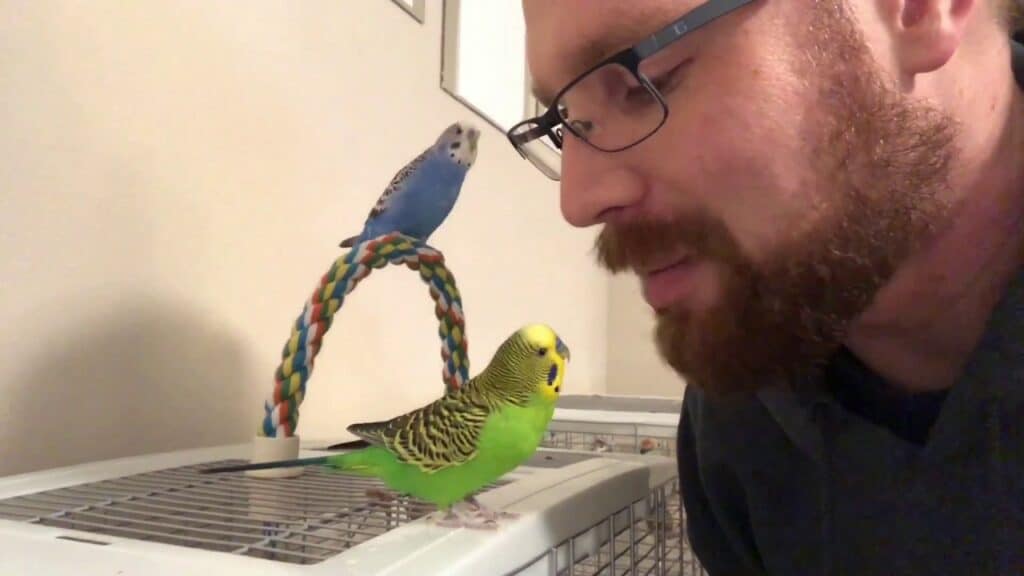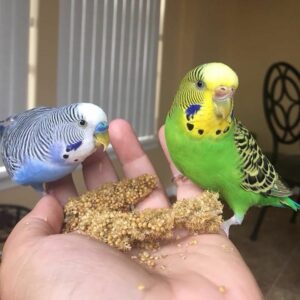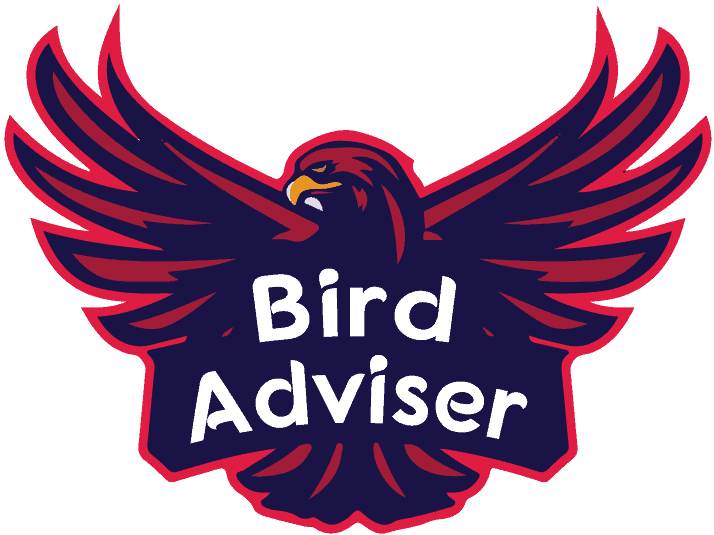Can Parakeets Talk? Yes, parakeets, specifically budgerigars (commonly known as budgies), have the ability to mimic and imitate sounds, including human speech.
While they are not as proficient at talking as some other parrot species like African grey parrots or Amazon parrots, some budgies have been known to learn and repeat a limited number of words and phrases.
Their speech is usually clearer if they start learning at a young age and are exposed to consistent and repetitive sounds.
It’s important to note that not all budgies will talk, and those that do might have varying levels of success in mimicking human speech.
Each bird has its own personality and aptitude for learning, so while some budgies might become quite chatty, others might not pick up speech at all.

Parakeets are friendly and social birds that get along with their surroundings and environment very quickly.
They adjust and make themselves comfortable with their owners, and they have the ability to catch all the voices or words that their owners speak in front of them.
You should know that commonly, male parakeets chatter a lot, and as compared to female parakeets, they learn new words quickly.
Female parakeets tend to be quieter, so they don’t get too friendly as compared to male parakeets.
Parakeets are very talkative birds, and they can mimic new words all day when their owner is around them.
How Does a Parakeet Talk?
The beak of the parakeet and its airways or nostrils are responsible for producing the sounds with which they talk.
When the owner is teaching a parakeet to talk or mimic words, it uses its airways and beak to produce these sounds.
They communicate with each other through the same process.
When they learn new words, the talking style or words aren’t exactly like humans as they never can be due to the anatomy of a parakeet that makes it impossible to speak those words.
They don’t have vocal cord-like human beings, which is why you will see a clear difference in their pronunciation.
Common Parakeet Sounds
Parakeets have a good ability to learn new words and mimic them, but they do also make a different sounds throughout the day as birds.
When you get a parakeet at home as a pet, you will hear him chattering or chirping all day.
If you get a pair, then they will be making noise throughout the day.
They get really noisy when they are happy together.
Parakeets can produce a wide range of sounds, and some of the commonly produced sounds by them are.
1. Singing
It’s common to hear parakeets singing all day as these birds are social and happy in nature.
Male parakeets sing a lot when they are happy as compared to female parakeets, who do not speak much.
2. Talking
Parakeets can talk a lot, and you can hear them murmuring to each other if you have a pair at home.
They talk in a wide range of sounds such as a contact call or chirping sounds, including chatter to trills, etc.
3. Whistling
When a parakeet is happy, he also creates whistling sounds to express his happiness.
Some owners also train their parakeets to whistle, and parakeets love doing that.
4. Screaming
When a parakeet feels danger, pain, or any kind of distress, he can start to scream loudly.
This can be happening because of any other pet present around him that makes him uncomfortable, or his health is not in good condition.
Can You Teach a Parakeet to Talk?
Yes, Parakeets can be trained to talk. Also, Parakeets are intelligent to catch words or phrases, but they don’t know what they are actually saying.
They just like to mimic words that are taught by the owners.
Pet owners can easily teach a parakeet to talk in many ways.
There are some conditions to be met, and then there are some easy practices by which they can learn.
These are shared below.
1. Give a Suitable Environment to Your Parakeet
The first thing to consider when you want to teach some words to your parakeet is the environment.
Environment greatly affects a parakeet’s behavior, and it also plays an important role in teaching your parakeet to learn new words or phrases.
Give it a friendly and talkative environment, and try not to have a pair when you are teaching new words to your budgie as this will divide its concentration, and he may not be interested in understanding you.
2. Select the Appropriate Time For Communicating
You should begin to instruct and prepare your parakeet after when he is quiet and has all the consideration on you.
Your bird will tune in and react better.
In case he is worn out or diverted, he will be unable to comprehend your signs and words.
You ought to be beginning the preparation of your parakeet in the first part of the day since it is a new beginning of the day, and your parakeet will be more dynamic around then.
Attempt to give him rest after the evening time as your pet may get lazy after entire day trills.
3. Rehash the Words and Phrases
At the point when you need to prepare your parakeet to talk, you should realize that it won’t pick you up in the first run-through.
You need to rehash the words or expressions for ordinarily during the day before your parakeet so he can get the tune of your statement and have the option to imitate it.
4. Give Him Treats

When your parakeet is behaving well and responding very well to your words and phrases, try to reward him with treats.
Whenever he learns or speaks a new word, give him treats or nourishment for whatever he is talking about.
This will cause him to feel better, and he will begin to be more alright with you.
Your bond with your parakeet will develop when you take care of him with fresh treats after he expresses and speaks out taught words and expressions.
You can utilize fruit items or fresh vegetables and other such things as compensation for your little pet.
5. Teach Words in Turn
You can speak an entire sentence to your parakeet, but he will fail to catch what you are saying.
Try to be gentle and repeat one word many times when you are around your parakeet.
He will catch your tune and try to mimic it.
When he gets a good grip on that word after a few days, then go for the new words.
Don’t mix up new words each day; otherwise, he will fail to learn.
You need to keep your voice and tone unmistakable, so your budgie comprehends it well.
6. Understand Parakeet’s Actions
You need to be a very good friend of your fellow bird to understand what he tries to do and how he behaves under some conditions.
Keep the interaction going throughout the day when you are free.
Spend some time with your bird as some behaviors are easier to interpret, so you and your parakeet will develop a good bond leading to a better understanding of actions and words used.
Stay in touch and keep him busy with activities and playful things.
While playing, repeat the words that you want him to learn to mimic.
It would require some patience and time, but your parakeet will get used to it with time.
The time will develop a better relationship between the owner and the parakeet, which will lead the parakeet to be more comfortable in catching the tune of new words and try to mimic them all day.
Conclusion
In conclusion, the intriguing world of parakeets and their ability to mimic human speech offers both delight and curiosity to pet enthusiasts.
While not all parakeets possess the gift of gab, some individuals of the budgerigar species have proven themselves capable of imitating words and phrases.
Their capacity to communicate in this unique way highlights the remarkable intelligence and adaptability of these charming birds.
Budgies, with their endearing personalities and propensity for forming strong bonds, can become captivating companions that add a touch of whimsy to our lives.
As we marvel at their attempts to imitate our language, it’s important to appreciate the individuality of each parakeet and the patience required to nurture their linguistic talents.
Whether or not they become chatterboxes, these colorful creatures continue to enchant us with their vibrant presence and the potential for surprising us with their mimicry.
FAQ
Can parakeets really talk like humans?
Yes, certain parakeet species, particularly budgerigars or budgies, have the ability to mimic human speech to varying degrees. While they may not achieve the same level of proficiency as larger parrot species, some budgies can indeed learn and mimic words and phrases.
Why do some parakeets talk while others don't?
Just like humans, individual parakeets have unique personalities and learning capabilities. Some parakeets may be more inclined to imitate sounds and speech due to their curiosity and social nature, while others might not show interest or have the same aptitude for mimicking sounds.
Can all parakeet species talk, or is it only budgerigars?
While budgerigars (budgies) are the most well-known parakeet species for their talking ability, some other parrot species within the parakeet family might also have limited speech capabilities. However, budgerigars are the most commonly recognized talking parakeets
Can you teach a parakeet to talk, or is it a natural ability?
You can indeed teach a parakeet to talk, but it requires patience, repetition, and consistent interaction. Starting with simple words and phrases, using positive reinforcement, and engaging the parakeet in regular conversations can help them pick up and imitate human speech.
At what age should I start teaching my parakeet to talk?
The younger the parakeet, the more receptive they might be to learning new sounds and speech. Ideally, you can start teaching them as young birds, but adult parakeets can also learn to talk, though it might take more time and patience.
Last Updated on August 17, 2023 by Lily Aldrin
